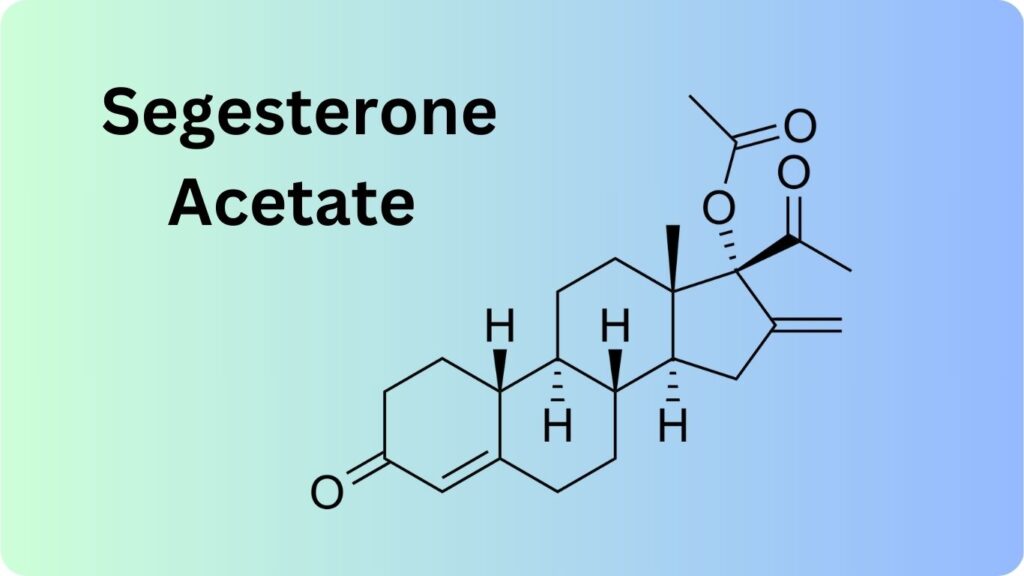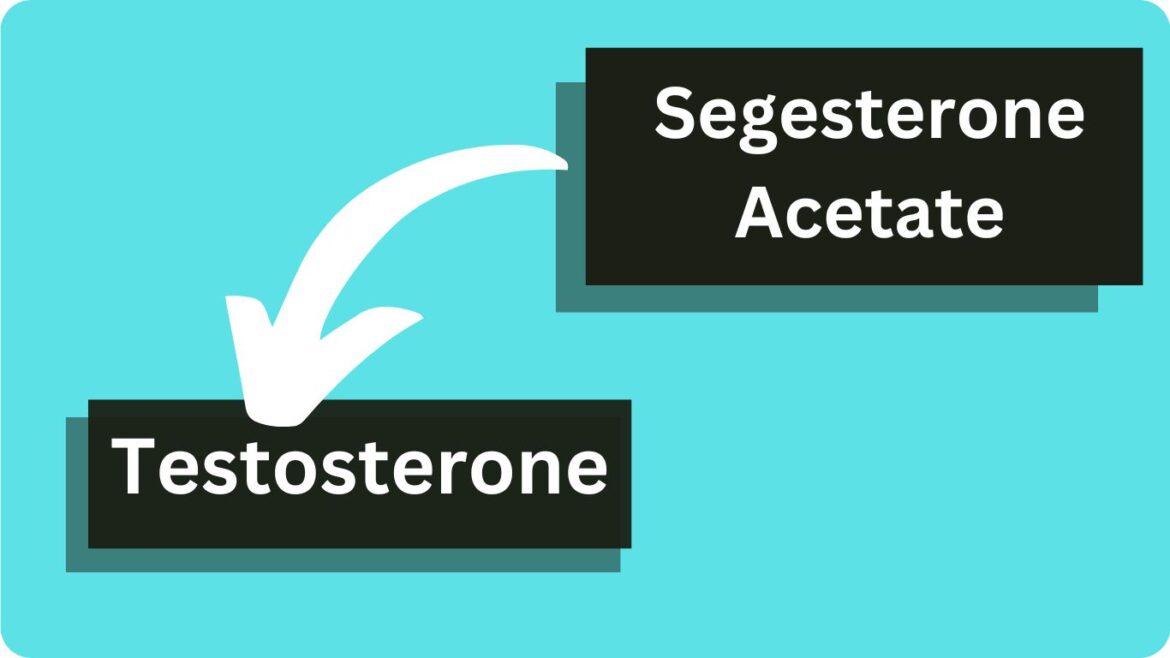Segesterone acetate is a synthetic progestin primarily used in hormonal contraception, known for its ability to suppress ovulation and regulate menstrual cycles. On the other hand, testosterone is a naturally occurring steroid hormone essential in the development of male physical characteristics, reproductive functions, and the maintenance of overall health. Despite being generally associated with male health, testosterone also plays significant roles in the female body. This blog post aims to delve into the interaction between segesterone acetate and testosterone, particularly focusing on how this progestin influences testosterone levels in men. We’ll explore the biological effects, potential side effects, and the broader implications of using segesterone acetate in various therapeutic contexts.
What is Segesterone Acetate: How it Effects Testosterone Levels in Men
What is Segesterone Acetate?
Segesterone acetate, also known as Nestorone, is a synthetic progestin, a form of the female hormone progesterone. Chemically, it is distinct because it is highly potent and has a unique configuration that enhances its stability and prolongs its action when used in the body. Segesterone acetate works primarily by preventing ovulation—the release of an egg during the menstrual cycle. It thickens the cervical mucus, making it difficult for sperm to enter the uterus, and alters the uterine lining to prevent implantation of a fertilized egg.
Primarily used in contraception, segesterone acetate is a key ingredient in certain contraceptive implants and vaginal rings, offering a long-acting, reversible method of birth control. Its effectiveness and low maintenance make it a favorable option for women seeking extended contraception. Additionally, because of its progestational effects, research is exploring its potential in treating endometriosis and certain types of breast cancer.
Understanding Testosterone Levels in Men
Testosterone, a crucial hormone predominantly produced in the testicles, plays a vital role in male health and development. It regulates key functions such as libido, muscle mass, bone density, and red blood cell production. Testosterone is also essential for maintaining energy levels, mood, and cognitive function. Normal testosterone levels vary widely, but they generally range from 300 to 1,000 ng/dL. Levels can fluctuate based on age, health, and individual factors.
Disruptions in testosterone levels can lead to significant health issues. Low testosterone, or hypogonadism, can cause symptoms like fatigue, depression, decreased strength, and sexual dysfunction. Conversely, abnormally high testosterone levels, often caused by supplementation or certain medical conditions, can lead to aggressive behaviors, acne, liver problems, and an increased risk of heart disease. Maintaining balanced testosterone levels is crucial for overall health and well-being.
Interaction between Segesterone Acetate and Testosterone
Segesterone acetate, a synthetic progestin, is primarily used in male harmonal contraceptive therapies but also influences the broader hormonal landscape in the body, including testosterone production. Progestins like segesterone acetate can impact the hypothalamic-pituitary-gonadal axis, which plays a crucial role in regulating testosterone levels. By influencing the secretion of gonadotropin-releasing hormone (GnRH) from the hypothalamus, segesterone acetate indirectly affects the production of luteinizing hormone (LH) and follicle-stimulating hormone (FSH) from the pituitary gland. These hormones are critical for stimulating testosterone production in the testes.
Studies have shown varying results regarding the extent to which segesterone acetate affects testosterone levels. Some research indicates a mild suppression of testosterone when used in combination with other hormones, such as estrogen, which is common in contraceptive formulations. For instance, a study published in the Journal of Clinical Endocrinology and Metabolism demonstrated that men using a contraceptive gel containing segesterone acetate and testosterone noted a decrease in natural testosterone production, though within clinically acceptable limits.

Potential Side Effects and Considerations
These findings underscore the importance of monitoring hormonal levels and adjusting therapeutic use as needed to maintain hormonal balance and mitigate any adverse effects on testosterone production.
Segesterone acetate, primarily used as a contraceptive, can influence testosterone levels and lead to various side effects. In men, reduced testosterone due to segesterone acetate may cause symptoms such as decreased libido, fatigue, and mood swings. Additionally, long-term alterations in testosterone levels might affect bone density, muscle mass, and overall metabolic health.
Particularly vulnerable are adolescents and the elderly. In adolescents, significant hormonal adjustments can impact physical development and growth patterns, possibly delaying or altering puberty milestones. For the elderly, diminished testosterone levels could exacerbate age-related conditions such as osteoporosis or muscle atrophy, potentially increasing the risk of falls and fractures.
Patients with pre-existing conditions like heart disease or diabetes should exercise caution. Hormonal fluctuations could influence cardiovascular function or glucose metabolism, necessitating more frequent monitoring and adjustments in their treatment plans. Thus, it is crucial for individuals considering segesterone acetate to consult healthcare professionals to tailor approaches based on their specific health profiles and needs.
Practical Applications and Advice
Segesterone acetate is typically prescribed as part of a male contraceptive methods , but its impact on testosterone levels necessitates careful consideration, especially in scenarios where hormonal balance is crucial, such as in men with pre-existing hormonal disorders or those undergoing gender-affirming treatment. When prescribing it, healthcare providers should evaluate baseline testosterone levels and consider individual health profiles.
Monitoring testosterone levels during segesterone acetate treatment is essential to ensure hormonal equilibrium and mitigate any adverse effects. Regular blood tests are recommended to track these levels. Depending on the results, adjustments might be needed, either in its dosage or through supplementary treatments. Additionally, lifestyle modifications like diet, exercise, and stress management can also help maintain stable testosterone levels and overall hormonal health.
Conclusion
segesterone acetate, primarily known for its use in contraception, has notable implications on testosterone levels in men. Understanding both the mechanics of segesterone acetate and its effects on testosterone is crucial for anyone considering this treatment. While it offers significant benefits, the potential impact on hormonal balance underscores the importance of careful management and monitoring. As with any hormonal therapy, consulting with healthcare professionals, undergoing regular hormonal evaluations, and adjusting treatment as necessary are key steps to ensuring health and efficacy. Staying informed and vigilant about these changes can help individuals navigate the complexities of hormonal health with confidence.
Also read: Understanding Testosterone Replacement Therapy: Benefits and Risks
